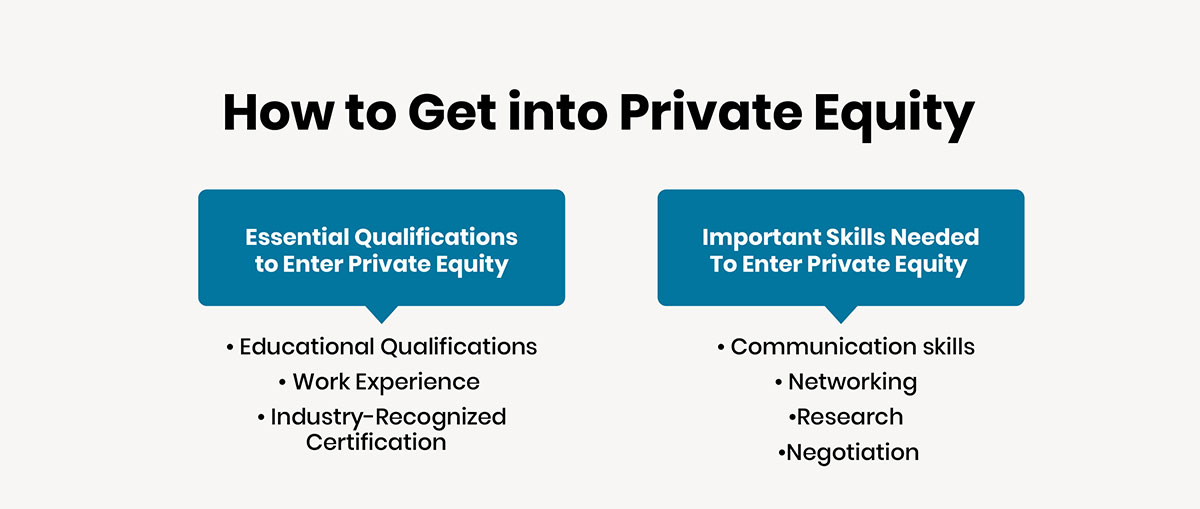What is Private Equity?
Private Equity (PE) refers to a form of investment that actively involves investing in privately held organizations or assets that are not publicly traded on a stock exchange. They pool funds from high-net-worth individuals, institutional investors, and other sources to obtain equity ownership in private organizations.
In simple terms, private equity investments are done in the mature businesses where the high net-worth of private individuals and enterprises invest their capital by buying major stakes in private enterprises or by purchasing enough shares of a public enterprise to acquire control and then delist it from stock exchanges and make it private. Private equity is a bigger subset of a more complex piece of the financial landscape called the private markets.
Private Equity Career Path
Many aspiring professionals are interested in aiming for a private equity career. Many key positions are available in a PE firm. The career path in private equity and hierarchy varies from one firm to the other. One can earn well if they are in any of the following positions.
-
Private Equity Analyst
- The entry-level job is mainly related to logistical deals.
- Average salary per annum – USD 100 to USD 150K
- Time for promotion to next level – 2-3 years
-
Associate
- In this position, deals and analytics are the main focus
- Average salary per annum - USD 150 to USD 300K
- Time for promotion to next level – 2-3 years
-
Senior Associate
- Sourcing deals, managing transactions, and monitoring organizations in the firm’s portfolio
- Average salary per annum - USD 250 to USD 400K
- Time for promotion to next level – 2-3 years
-
Vice President
- Manager of almost all the deals
- Average salary per annum - USD 350 to USD 500K
- Time for promotion to next level – 3-4 years
-
Principal or Director
- Negotiator and also a top generator of deals
- Average salary per annum - USD 500 to USD 800K
- Time for promotion to next level – 3-4 years
-
Managing Director or Partner
- Fundraiser and Chief Representative
- Average salary per annum - USD 700K to USD 2M
How to Get into Private Equity
The professionals who are employed in the private equity industry mainly works for investing companies, like pension funds and large private-equity enterprises. The hiring companies in this industry are usually backed by investors because to get control of a company needs huge funding.
Many individuals are often perplexed by a question about how to get into private equity. The most common way an individual can get into the private equity industry sector is through investment banking. Several professionals are looking for opportunities in the private equity sector so that they can stay ahead in their finance careers.
Prerequisites
If an individual is seeking a career in private equity, then they will require the following:
- Top academic credentials such as grades, test scores, and university reputation.
- Good networking and preparation for the interviews.
- Relevant work experience that includes a sound knowledge of transactions.

Essential Qualifications to Enter Private Equity
The private equity sector is looking for the best talent in the sector of financial services.
-
Educational Qualifications
If one aims for a private equity career then they are required to have a bachelor's degree in any finance-related field, such as:
- Finance
- Mathematics
- Economics
- Accounting
- Statistics
If an individual has prior banking experience and is way too senior, then one can choose the private equity industry as an Operating Partner or Consultant. Many recruitment managers also look for people who have an MBA followed by relevant experience in the investment banking industry.
But if one wants to get into this industry in an entry-level position then they should be less than 30 years. However, if one is going for a senior-level position and have relevant experience, then age is not considered.
-
Work Experience
Work experience related to private equity has been an issue with several private equity firms for a while, with many believing that the MBA tended to get professionals with a rigid mindset. But things have changed immensely, mainly due to the emerging of online degrees.
An individual who has the right experience could develop many connections with people from around the globe and across various other industries will offer individuals the scope to develop a strong network that will be very resourceful in one’s career.
-
Industry-Recognized Certification
Obtaining a private equity certification will strengthen the candidature for the job roles to which one has applied. These qualifications are a great add-on as they are completely skill-specific, highly professional, and are preferred by several recruiters in the private equity sector.
One such certification is Chartered Private Equity Professional (CPEP™), which is a professional credential that was developed by the United States Private Equity Council (USPEC). USPEC offers comprehensive qualifications for aspiring individuals who want to become certified private equity professionals. CPEP™ is designed to excel and to enhance one’s finance skills up to a level that is expected by the top PE and VC firms.
Top Skills to Excel in Private Equity
-
Communication skills
PE is a team effort, so one must be interactive with other team members to sign deals with organizations and need good communication skills to showcase their ideas.
-
Networking
To crack new deals, networking with potential investors is required. Networking is also very useful to enhance one's private equity career to connect with employers on a shared interest, like attending the same college, getting the same certification, and so on.
-
Research
To discover potential deals, market research, and data extraction is required. Research related to ratio analysis, recommendations, and reports on investment opportunities that investment banks, institutions, or their clients might be interested in.
-
Negotiation
To help close deals, negotiation skills are required also get a clear understanding of priorities, pressures, options, and interests. An active participation in negotiation with potential investors is carried out.
To End With…..
If you are thinking about whether private equity is right for you or not, then it is a must to thoroughly analyze the pros and cons before entering the field. If you possess a passion for financial investing deals and are looking for some lucrative and growth-driven opportunities, then this is the perfect place. Several private equity firms are looking for dynamic professionals who are confident, independent, assertive and have analytical qualities.







